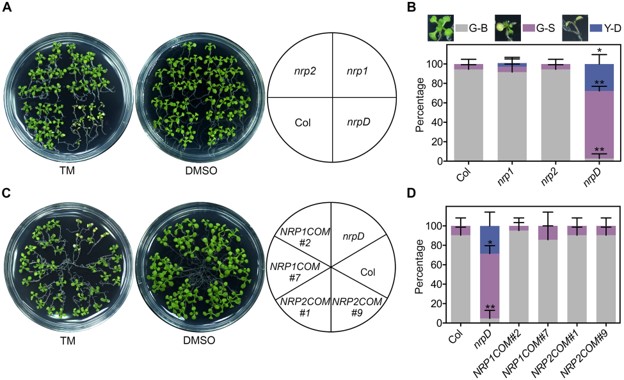Under the instruction of Prof. Hou Xingliang, Dr. Yang Yuhua and associate Prof. Liu Xu at the Agricultural and Biotechnology Research Center of South China Botanical Garden, Chinese Academy of Sciences, revealed a novel mechanism in regulation of endoplasmic reticulum stress-induced cell death in plants. This finding was published online in plant physiology on July 20. Yang Yuhua and Liu Xu are the co-first authors of this paper, and Hou Xingliang is the corresponding author.
Endoplasmic reticulum (ER) is an important place for synthesis and processing of proteins in eukaryotic cells. Environmental stresses induce increased unfolded or misfolded proteins accumulated in the ER, which would cause ER stress. To restore ER homeostasis and survive, an orchestrated signaling pathway known as the unfolded protein response (UPR) is engaged. However, prolonged or severe stress can trigger the "terminal UPR" signaling, then ultimately commit cells to programmed death. Thus, ER stress response is closely related to the final decision of plant cells fate under stress.
In this study, the researchers showed that NRP1 and NRP2, two homologous N-rich proteins harboring a Development and Cell Death (DCD) domain, act as key pro-survival factors in ER stress response by inhibiting cell death. Loss-of-function of NRP1 and NRP2 in Arabidopsis accelerates cell death, and results in increased hypersensitivity to ER stress inducer tunicamycin (TM) and decreased tolerance to the environmental stresses such as high salt and high temperature. Expression analysis showed that NRP2 is constitutively expressed, while NRP1 is up-regulated under ER stress.
In Arabidopsis thaliana, bZIP60 is an important transcription factor in UPR that activates the expression of a number of ER stress-related genes. Notably, bZIP60 serves as the activator of NRP1, but not NRP2, by directly binding to the UPRE-I element in the NRP1 promoter in ER stress response. Moreover, the transcriptional regulation of NRP1 activated by bZIP60 is independent of the classical IRE1a / b-mediated bZIP60 mRNA splicing pathway. These findings reveal a novel pro-survival strategy in plants that NRPs pathway is activated to suppress cell death signal transmission by different transcriptional regulation, so as to improve survival of plants under adverse conditions.




